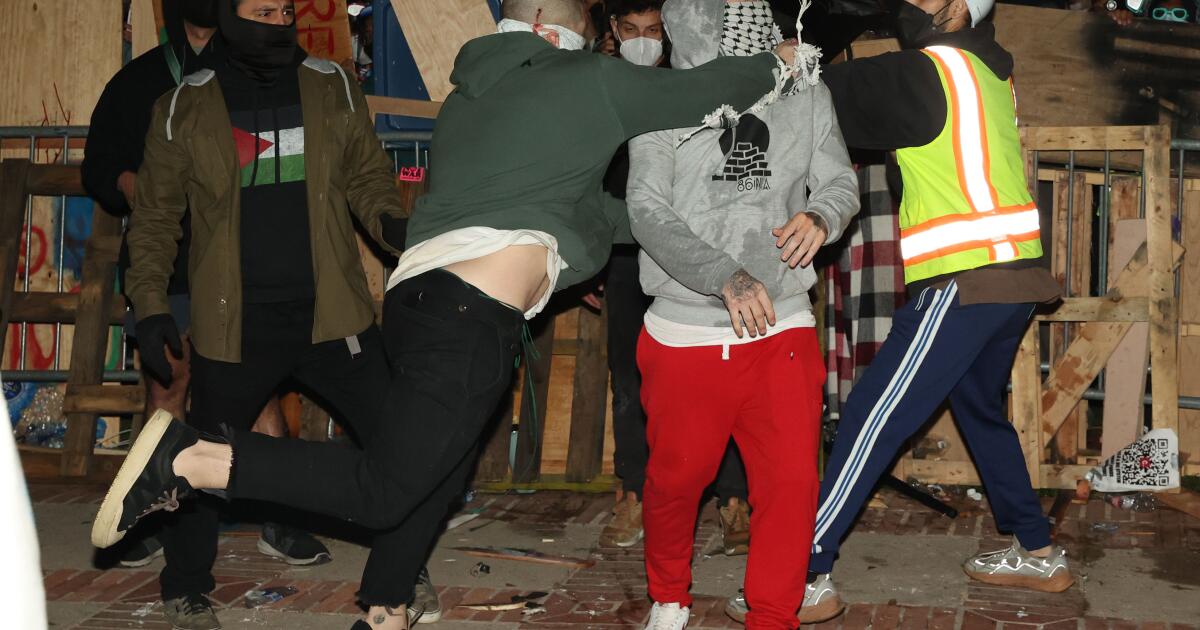Syrian authorities forces have misplaced management of Daraa metropolis, in accordance with a conflict monitor, marking one other setback for President Bashar al-Assad. This follows insurgent teams taking management of different key cities. Daraa is called “the cradle of the revolution” on account of its position within the early days of Syria’s civil conflict. In 2011, activists accused the federal government of detaining and torturing boys who wrote anti-Assad graffiti on their college partitions. The Syrian Observatory for Human Rights (SOHR) reported that whereas Islamist-led insurgent alliances captured Aleppo and Hama, native armed teams took management of Daraa. The Observatory stated, “Native factions have taken management of extra areas in Daraa province, together with Daraa metropolis they now management greater than 90 per cent of the province, as regime forces successively pulled out.” Daraa province shares a border with Jordan. ‘Homs should not fall’ Rebels have superior quickly and reached the outskirts of Syria’s Homs metropolis, at the same time as Lebanese militant group Hezbollah despatched a small variety of “supervising forces” from Lebanon to Syria in a single day to assist stop anti-government fighters from seizing the strategic metropolis of Homs. “Homs should not fall,” a Hezbollah official was quoted as saying by information company Reuters.The federal government is making an attempt to strengthen its collapsing frontlines to keep up management and protect Assad’s 24-year rule. The insurgent advance started with the seize of Aleppo every week in the past, adopted by swift losses for the federal government throughout Syria. Along with Aleppo and Hama, rebels have additionally taken Deir al-Zor within the east and risen up in Suweida and Daraa. Movies on-line present rebels celebrating their good points in these areas. The Syrian navy stated it’s conducting airstrikes round Hama and Homs whereas repositioning its forces in Daraa and Suweida. The fast tempo of occasions has raised considerations in Arab capitals concerning the potential for elevated regional instability.Islamist insurgent commander addresses considerations of minoritiesHassan Abdel Ghani, a Syrian Islamist insurgent commander, sought to reassure spiritual minorities following the takeover of key areas by an Islamist-led insurgent alliance. He stated, “We ask that each one sects be reassured, for the period of sectarianism and tyranny has gone away without end.” The feedback got here because the insurgent alliance, led by Hayat Tahrir al-Sham (HTS), advances on Homs. HTS launched its offensive on November 27, taking up areas with populations from numerous spiritual sects.Additionally learn: Who’re Hayat Tahrir al-Sham, jihadist group behind resurgence of Syria battle?Syria’s Christian group has largely supported the Assad authorities, viewing it as a protector of minorities. Non secular minorities confronted persecution when the Islamic State (IS) group managed giant components of Syria. Homs holds strategic significance, linking the capital Damascus to the coastal areas of Latakia and Tartus, that are strongholds of Assad’s Alawite minority. Resurgence of the Syrian civil warThe Syrian civil conflict started in 2011 with a authorities crackdown on democracy protests. The battle has killed greater than 500,000 individuals and displaced over half the inhabitants. Since November 27, a insurgent alliance led by HTS has launched a serious offensive, capturing Aleppo, Hama, and different cities. HTS chief Abu Mohammed al-Jolani in a latest interview with CNN stated, “The objective of the revolution stays the overthrow of this regime. It’s our proper to make use of all accessible means to attain that objective.” HTS, which originated because the Syrian department of Al-Qaeda, is taken into account a terrorist group by Western nations. The insurgent offensive in Syria started on the identical day a ceasefire was declared in Lebanon, ending hostilities between Israel and Hezbollah. Hezbollah, a key ally of the Assad authorities, has performed a serious position within the Syrian battle alongside Russia and Iran. The latest insurgent advances have created uncertainty for Syria’s allies and raised fears of additional regional instability.
Support authors and subscribe to content
This is premium stuff. Subscribe to read the entire article.





















